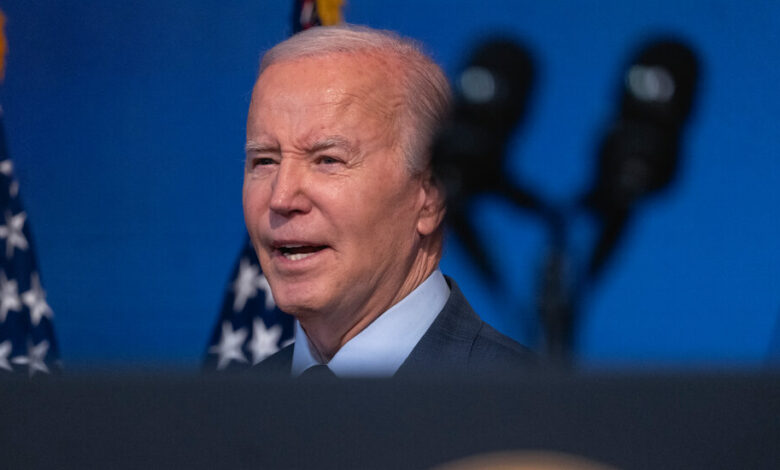Opinion | Why Biden Should Make an Immigration Deal With Republicans

Over the last few months, the incredulous question — How can Donald Trump possibly be leading the polls; there must be some mistake — has given way to the clear reality: Something in American life would need to change for Joe Biden to be favored for re-election in November 2024.
The good news for Biden is that it’s easy to imagine developments that would help his re-election bid. Notwithstanding a fashionable liberal despair about how bad vibes are deceiving Americans about the state of the economy, there’s plenty of room for improvements — in inflation-adjusted wages, interest rates, the stock market — that could sweeten the country’s economic mood. (Just sustaining the economic trajectory of the last few months through next summer would almost certainly boost Biden’s approval ratings.)
The looming Trump trials, meanwhile, promise to refocus the country’s persuadable voters on what they dislike about the former president; that, too, has to be worth something in the swing states where Biden is currently struggling.
In both those cases, though, the president doesn’t have much control over events. No major economic package is likely to pass Congress, and whatever influence you think his White House did or didn’t exert over Trump’s indictments, Biden staffers won’t be supervising jury selection.
There is an issue that’s hurting Biden, however, where the Republican Party is (officially, at least) quite open to working with the president, provided that he’s willing to break with his own party’s interest groups: the security of the southern border, where Border Patrol apprehensions remain stubbornly high even as the president’s approval ratings on immigration sit about 30 points underwater.
There is a commonplace interpretation of the immigration debate that treats the unpopularity of an uncontrolled border primarily as an optics problem: People are happy enough to have immigrants in their own communities, but they see border disorder on their television screens and it makes them fearful about government incompetence. Sometimes this interpretation comes packaged with the suggestion that the people who worry most about immigration are rural voters who rarely see a migrant in real life, as opposed to liberal urbanites who both experience and appreciate diversity.
The last year or so of blue-city immigration anxiety has revealed the limits of this interpretation: Place enough stress on New York or Chicago, and you will get demands for immigration control in even the most liberal parts of the country.
But really, there’s never been good reason to think that immigration anxiety only manifests itself telescopically, among people whose main exposure to the trend is alarmist Fox News chyrons.
Consider a new paper from Ernesto Tiburcio and Kara Ross Camarena, respectively a Tufts University economics Ph.D and a Defense Department analyst, which uses Mexican-government ID data to track the flow of Mexican migrants into counties in the United States, and finds that exposure to immigrants increases conservatism among natives. As the migrant flow goes up, so does the vote for Republicans in House elections: “A mean inflow of migrants (0.4 percent of the county population) boosts the Republican Party vote share in midterm House elections by 3.9 percentage points.” And the inflow also shifts local policy rightward, reducing public spending and shifting money toward law enforcement as opposed to education.
This suggests that a pro-immigration liberalism inevitably faces a balancing act: High rates of immigration make native voters more conservative, so a policy that’s too radically open is a good way to elect politicians who prefer the border closed.
You can see this pattern in U.S. politics writ large. The foreign-born population in the United States climbed through the Obama presidency, to 44 million from 38 million, and as a share of the overall population it was nearing the highs of the late 19th and early 20th century — a fact that almost certainly helped Donald Trump ride anti-immigration sentiment to the Republican nomination and the presidency.
Then under Trump there was some stabilization — the foreign-born population was about the same just before Covid-19 hit as it had been in 2016 — which probably help defuse the issue for Democrats, increase American sympathy for migrants, and make Biden’s victory possible. But since 2020 the numbers are rising sharply once again, and the estimated foreign-born share of the American population now exceeds the highs of the last great age of immigration. Which, again unsurprisingly, has pushed some number of Biden voters back toward Trump.
Border control in an age of easy global movement is not a simple policy problem, even for conservative governments. But policy does matter, and while the measures that the White House is reportedly floating as potential concessions to Republicans — raising the standard for asylum claims, fast-tracking deportation procedures — aren’t quite a pledge to finish the border wall (maybe that’s next summer’s pivot), they should have some effect on the flow of migrants north.
Which makes them a distinctive sort of policy concession: A “sacrifice” that this White House has every political reason to offer, because Biden’s re-election becomes more likely if Republicans accept.




